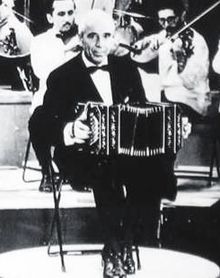Osvaldo Fresedo
| Osvaldo Fresedo | |
|---|---|
 |
|
| Born |
May 5, 1897 Buenos Aires, Argentina |
| Died | November 18, 1984 (aged 87) Buenos Aires, Argentina |
| Occupation | Musician, composer, and bandleader |
| Years active | 1925 - 1980 |
Osvaldo Fresedo (May 5, 1897 - November 18, 1984), nicknamed El pibe de La Paternal ("the kid from La Paternal") was an Argentine songwriter and director of a tango orchestra. He had the longest recording career in tango, from 1925 to 1980.
Fresedo was born into a middle-class family in La Paternal, Buenos Aires, Argentina. His mother gave him the first music lessons. While he was still small, his family moved to a working-class neighborhood, and it was there he began his interest in tango. He learned to play the bandoneón and as a teenager joined several of the most famous orchestras of the era of the Guardia Vieja ("Old Guard").
In 1920 traveled to United States. In Camden, New Jersey he recorded a few albums with a quartet that also included violinist Tito Rocatagliatta and pianist Enrique Pedro Delfino.
Back in Buenos Aires, he formed his first orchestra which, from the outset, displayed his trademark style. Although his style evolved somewhat in the following decades, its essence remained the same: his performing group always displayed true elegance. Fresedo was one of the innovators of tango in the early 1920s, along with such other young musicians of the time as Julio de Caro and Juan Carlos Cobián. All of them brought a high level of musicianship and were thus able to bring about the more refined musical style that characterized the what later became known as the tango of the Guardia Nueva ("New Guard").
In the 1920s, Fresedo worked feverishly as a composer and conductor. Before this time he had already composed "El espiante" ("The Rejected One"), to which he now added "Vida mía" ("My Life"), "El Once" (the name of a neighbourhood in Buenos Aires although the tango was composed for the 11th Baile del Internado), and "Pimienta" ("Pepper") among others.
His activity as an orchestra conductor was tireless, as a result of demand for his recordings and their wide acceptance among the public, especially the more affluent, obligating him to divide his orchestra into four groups and place each in a different nightclub. It was, without doubt, his best time from a commercial point of view, and also probably as a composer of tunes. Between 1925 and 1928, Fresedo recorded about 600 pieces for the Odeón label.
...
Wikipedia
